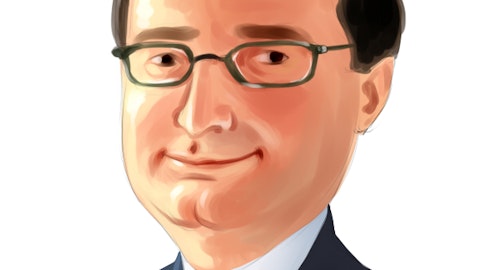Longleaf Partners Fund, a Memphis-based fund under Southeastern Asset Management, recently released its Q1 2020 Investor Letter – a copy of which can be downloaded here. Southeastern Asset Management was founded in 1975 by Mason Hawkins. Longleaf Partners Fund returned -28.87% in Q1 2020, while the S&P 500 returned -19.60%.
In the said letter, Mason Hawkins highlighted a few stocks and DuPont de Nemours, Inc. (NYSE:DD) is one of them. DuPont provides technology-based materials, ingredients and solutions. Year-to-date, DD stock lost 34.9% and on April 22nd it had a closing price of $39.87. Here is what Mason Hawkins said:
“After selling Dow DuPoint in early 2019 as it reached our appraisal value, we initiated a new position in DuPont in February and added heavily during the March sell-off. After spinning its commodity chemicals business Dow in April 2019 and its seeds and agriculture chemicals business Corteva in June 2019, DuPont has a collection of highreturn assets in nutrition, electronics and construction. CEO Ed Breen has a strong history of smart capital allocation, cost cutting and value additive M&A activity, and we believe he can lead the company effectively through this difficult period. We were especially encouraged by the announcement late last year that DuPont is spin-merging its Nutrition segment with International Flavors and Fragrances, creating a powerhouse business and improving DuPont’s balance sheet even further when the deal closes later this year.”
Longleaf Partners Fund’s comments on Hyatt
In the said letter, Mason Hawkins also highlighted Hyatt Hotels Corp (NYSE:H) stock. Hyatt is a hospitality company based in Chicago. Here is what Mason Hawkins said:
“We bought global hotel company Hyatt for less than half of our appraisal value in March, as travel industry stocks faced indiscriminate selling. The business combines many of the qualities we look for in every new investment: a safe balance sheet, ownerpartners with a great track record, a proven brand with loyal customers, high-margin royalty income and owned real estate with a high replacement cost. The pandemic will freeze many of the company’s operations for a large part of this year, but the business is positioned to withstand even a protracted shutdown and prosper on the other side. The balance sheet has lower net leverage than virtually all its competitors, and a majority of the value comes from capital-light franchise fees. We have had a long history of successfully investing in this industry, typically initiating our investment during times of significant industry disruption. Notably, the Fund has invested in global hotel operators in three primary periods in our recent history: InterContinental during the Eurozone crisis in 2011-12, Marriott and InterContinental in the GFC in 2008-09 and Marriott, Host Marriott and Hilton in 2000, increasing exposure after the 9-11 attacks in 2001-03. In each case, the environment felt highly uncertain, revenue per available room (REVPAR) was declining and the near-term outlook for travel amid a potential recessionary environment felt bleak. However, in each case, we felt confident in the financial strength of each business, as well as management teams’ abilities to go on offense to steer the individual businesses through a difficult period.”
In Q4 2019, the number of bullish hedge fund positions on Hyatt stock decreased by about 13% from the previous quarter (see the chart here).
Disclosure: None. This article is originally published at Insider Monkey.




